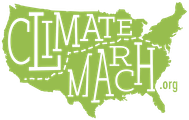Local Climate Change Issues for Tucson, Arizona, and the Desert Southwest
 John Jorgensen, climate marcher from Tucson, AZ
John Jorgensen, climate marcher from Tucson, AZ
I came on this march in part because the climate is changing dramatically in Tucson, AZ. When I first came to Tucson, in 1980, there were spectacular monsoon storms in the summer. Every summer the humidity and heat would build up throughout the day until storm clouds would form, lightning and thunder could be heard, and then a huge dust cloud and a wall of darkness and rain would come thundering through. The sheets of water would drench the desert and break the heat long enough to make the wait worthwhile. We haven’t had a monsoon like that over fourteen years. The increased heat and drought conditions of climate change have kept them at bay.
A local climatologist, Greg Garfin, has written editorials about the fact that we’ll be seeing an extra month of 100 degree plus temperatures, with even hotter extremes at the height of summer. The city of Tucson has formed a volunteer climate emergency committee that is looking at the serious likelihood of extreme heat wave conditions coupled with power outages, and the deadly effect that would have on the most vulnerable members of our community. Before leaving for the march I attended a conference of doctors, public health professionals, and local officials called, the “Climate Smart Southwest”, that was sponsored by Physicians for Social Responsibility (PSR). The main emphasis of the conference was not if these deadly conditions would occur, but when, and would we be ready for them? Where would elderly people go? How would power be maintained for emergency facilities?
Another University of Arizona climatologist, Jonathon Overpeck, stated in a recent (and unprecedented) press/ public conference that the American southwest is very likely at the beginning of a mega-drought. A mega-drought lasts over a 100 to 100’s of years. There’s no way to know for sure if you’re in a mega-drought until you are well into it. What doesn’t help, is that humans are adding more greenhouse gas at an accelerating rate, making an already bad condition worse.
I had these take-aways from Dr. Overpeck’s release of his research results: Our state legislators are pretending two things that are just not so. 1) They want to pretend climate change doesn’t exist and 2) they want to pretend we have water that we don’t. The Colorado River water we get for the Central Arizona Project, CAP, is 25% over-allocated compared to what it can actually provide. The two main reservoirs in Arizona, Lake Powell and Lake Mead, are already showing ‘bathtub rings’ and have lost half their capacity for drinking, irrigation, and power generation (hydro-electric) water. Professor Overpeck’s point was that our politician’s concern for re-election dollars outweigh the health and safety concerns of their constituents.
The climate crisis is very real to the mayor, city council, and health professionals of Tucson. In fact, Jonathon Rothschild is the first mayor in the country to endorse the Great March for Climate Action and declared April 8th, Climate Action Day in honor of our passing through.
What are the climate issues for Tucson? It’s already hot and it’s getting hotter, longer.
